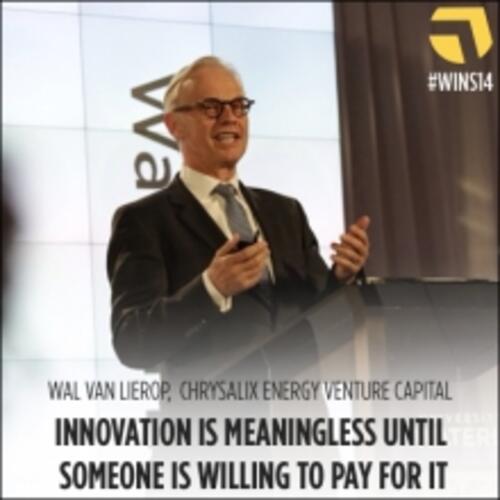
Waterloo Innovation Summit: hardware on the rise
Hardware is spawning a strong ecosystem for the next generation of technology development.

Hardware is spawning a strong ecosystem for the next generation of technology development.
By Media RelationsHardware is making a comeback and is spawning a strong ecosystem for the next generation of technology development, according to leading entrepreneurs at the Waterloo Innovation Summit at the University of Waterloo.
After several years in which software led the technology industry, Eric Migicovsky, founder and CEO of Pebble, and Matt Rendall, founder and CEO of Clearpath Robotics Inc., said that the time is ripe for hardware-focused companies to grow. But they had a caveat: in order to succeed, companies need to focus as much on their business case as the technology they are developing.
“A startup’s main goal is to make something that people want,” said Migicovsky, adding that understanding a product’s market fit is paramount for success.
Rendall discussed the growing need for robotics, from search and rescue to performing what he calls the dullest, dirtiest and deadliest jobs. He said that his company’s key to success is working closely with customers to learn what they need and want.

The importance of understanding the business case also came up again in the talk by Wal van Lierop, the co-founder and CEO of Chrysalix Energy Venture Capital. He discussed the need for engineers and entrepreneurs to think critically when they are sitting in front of their computer at 3 a.m. looking over the latest iteration of their great technology idea.
Innovation is meaningless until someone is willing to pay for it, said van Lierop.
Helge Seetzen, CEO of TandemLaunch Inc., said that young companies need to push the envelope when it comes to their technology developments but be more conservative when assessing the market’s need for their technology.
“Market risk kills companies and therefore makes for bad investments,” Seetzen said.
Referring to the process that Clearpath has taken to understand and respond to its market, Matt Rendall agreed that it was critical to understand the business case for his company’s products.
“It is not market risk, it is proven that people want robotics,” he said. He also agreed that it is important to take technology risks saying that startups need to “fail fast, fail cheap, fail often.”
On funding Seetzen said that it is important for investors to have specialized knowledge in the fields they are investing in so they can properly assess a technology’s market risk.
Feridun Hamdullahpur, president and vice-chancellor of the University, opened the summit by addressing the importance of technology innovation in building a stronger global community. He stressed the importance of the role that Waterloo Region plays on the global stage, with the University at its heart.
Hamdullahpur specifically underlined the region’s strength as a technology hub as well an area with many entrepreneurs. “It is very rare to find both in existence in the same place,” he said.
During a panel discussion, Stephen Lake, co-founder and CEO of Thalmic Labs Inc, Michael Litt, founder of Vidyard, and Eric Migicovsky discussed the close-knit Waterloo ecosystem. The young entrepreneurs reinforced the positive impact of having other technology entrepreneurs so close at hand. “We have talent in the ecosystem and the community,” said Lake.
Litt added that his education at University of Waterloo was critical in his development as an entrepreneur. “The university education here was absolutely vital to where I am today,” he said.
Gary Goodyear, Minister of State responsible for the Federal Economic Development Agency for Southern Ontario, also spoke at the summit. Goodyear said that Canada is “in a position of envy of so many countries around the world” as he discussed the importance of innovation in Canada’s future.
Susan Fonseca, founder of Women@TheFrontier, spoke about the lack of women as technology role models and the impact this issue has on the producing the next generation of women innovators.
Fonseca mentioned that currently only four per cent of venture capital funding is going to female-led initiatives. Her organization is working to create a network of female game-changers around the world so it is easier to identify those innovators who can become role models for the next generation of women technology entrepreneurs.
As Canadian technology entrepreneurs look toward future, long-term success, Tom Jenkins, chairman of OpenText Corporation, had some advice – understand that there is value keeping your cards close to your vest.
“It is actually smart staying under the radar a while…the longer you wait, the more value you get,” said Jenkins.
More than 30 speakers presented at the University of Waterloo 2014 Innovation Summit. A video archive of speakers and panel sessions is available online.
In just half a century, the University of Waterloo, located at the heart of Canada's technology hub, has become one of Canada's leading comprehensive universities with 35,000 full- and part-time students in undergraduate and graduate programs. Waterloo, as home to the world's largest post-secondary co-operative education program, embraces its connections to the world and encourages enterprising partnerships in learning, research and discovery. In the next decade, the university is committed to building a better future for Canada and the world by championing innovation and collaboration to create solutions relevant to the needs of today and tomorrow. For more information about Waterloo, please visit www.uwaterloo.ca.
-30-
Nick Manning
University of Waterloo
519-888-4451
226-929-7627
www.uwaterloo.ca/news
@uWaterlooNews
Attention broadcasters: Waterloo has facilities to provide broadcast quality audio and video feeds with a double-ender studio. Please contact us to book.

Read more
Waterloo co-op student applies engineering and tech skills at Caivan to support purpose-built housing and build land-development expertise

Read more
Alum and founder Marc Lafleur shares how his entrepreneurship playbook has changed since selling his first company

Read more
How Doug Kavanagh’s software engineering degree laid the foundation for a thriving career in patient care
The University of Waterloo acknowledges that much of our work takes place on the traditional territory of the Neutral, Anishinaabeg, and Haudenosaunee peoples. Our main campus is situated on the Haldimand Tract, the land granted to the Six Nations that includes six miles on each side of the Grand River. Our active work toward reconciliation takes place across our campuses through research, learning, teaching, and community building, and is co-ordinated within the Office of Indigenous Relations.